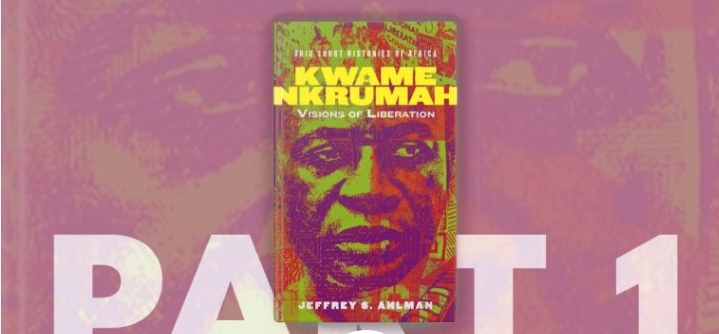The Story of Vishnu Raghavan, and his review of Kwame Nkrumah: Visions of Liberation
By Bruce Gilley
What does the crushing of intellectual curiosity among our students by the contemporary academy look like? Let me tell you the story of Vishnu Raghavan.
Raghavan is a second generation American whose parents moved to the U.S. from India. He grew up in Seattle and gained his undergraduate degree from Arizona State University in 2023. The same year, he joined the Master’s programme in global, international, and comparative history at Georgetown University.
His is the classical American story of upward mobility and immigrant success. But at Georgetown, he found that the Western values that undergird that success are no longer in favour.
While living in Washington D.C., Raghavan often heard from Ghanaian taxi drivers about their hatred for the country’s tyrannical founder Kwame Nkrumah, who ruled from 1957 to 1966. This was a surprise to Raghavan because everything he’d been taught at Georgetown about anti-colonialists like Nkrumah was positive, mainly written by people who never had to experience the effects of their devastating rule. Out of curiosity, Raghavan read Kwame Nkrumah: Visions of Liberation by the Smith College history professor Jeffrey Ahlman. The 2021 book ignores Nkrumah’s authoritarian and corrupt rule and praises his destructive drives for decolonization and socialism.
Raghavan pitched a review of Ahlman’s book to the The Footnote, a graduate-run journal in Georgetown’s College of Arts and Sciences. The editors were delighted. Until, that is, they read Raghavan’s review. As you can read here, it is a withering rebuttal of Ahlman’s book. Ahlman romanticizes the pre-colonial past and ignores the fact that Nkrumah took a functioning colonial economy and drove it off a cliff. (This is not surprising: Ahlman’s 2017 book on Ghana, Living with Nkrumahism, praised the “participatory” nature and “lived experiences” of his regime).

Having talked to ordinary Ghanaians, Raghavan was shocked to learn how little Ahlman appreciated the real nature of Nkrumah’s rule and the debate on it in contemporary Ghana. “There will likely be little to no blowback from Ghanaians,” he wrote to me about his review. “In fact, I am fairly sure that there will be tremendous praise that a 23-year-old Indian-American understands their history far better than the chair of history at Smith College.”
Ahlman seems to have learned more about the country since those books, it must be allowed. His 2024 book, Ghana: A Political and Social History, notes that for many Ghanaians, “the legacy of independence-era Ghana did not ring of hope or inspiration. Rather, it was one of emerging despotism, and Nkrumah, for them, was the face of that tyranny.”
The editors of The Footnote were not amused by Raghavan’s review. Any and all articles that discussed colonialism, they believed, must begin with the premise that it was an unmitigated evil. “We cannot publish an article that defends British colonialism in Africa,” they replied to Raghavan. “A denial of the far-reaching effects of the physical and psychological brutality of colonialism is just not something we can endorse.” One wonders if they read the review, since it is none of those things, only a careful defence of the need for an objective history of Ghana.
To foreclose any talking back, Raghavan was directed to read radical journalist Nathan Robinson’s hyperbolic attack on my 2017 article “The Case for Colonialism”, that called my article ‘Holocaust denial’ and which is now ritually cited by anyone unwilling to debate the issues. (Just to remind readers, my article is no longer accessible online because of threats of violence against the journal editor who published it).
For the editors of The Footnote it seems, as well as for the whole institutional apparatus of Western higher education, it suffices to neuralgically reject anything outside of the ideological bubble in order to determine whether an idea is “something we can endorse.”
The spectacle of a white woman citing a white man to deny the right of a brown man to have complex thoughts on colonialism is too delicious to merit further discussion. More seriously, the desk rejection is laughable because of Georgetown’s much-vaunted “humanities initiative” of 2021 that was supposed to spark open conversations on campus and beyond. When The Footnote was launched, it proclaimed that it “celebrates the intellectual spectrum of higher education” and “collects diverse historical perspectives…believing that everyone has something to say about the past.” These days, humanities and social sciences departments have zero credibility when they say such things. As Raghavan wrote to me: ‘It is a tragedy that The Footnote will violate its own rules to censor opinions with which it disagrees, essentially serving as a gatekeeper of history.’
The immediate challenge for Raghavan, of course, is surviving in his history group and earning a degree. As he wrote to me with gallows humor: “There is only one conservative in the cohort, and that includes me.”
In the longer term, the case merely illustrates the insulation of major universities from the seismic shift in public sentiments about the lack of intellectual diversity on Western college campuses. If we need yet more evidence about the urgency of reforming higher education with a stiff new set of mandates from elected governments, ‘The Story of Vishnu’ provides it.
First published in History Reclaimed